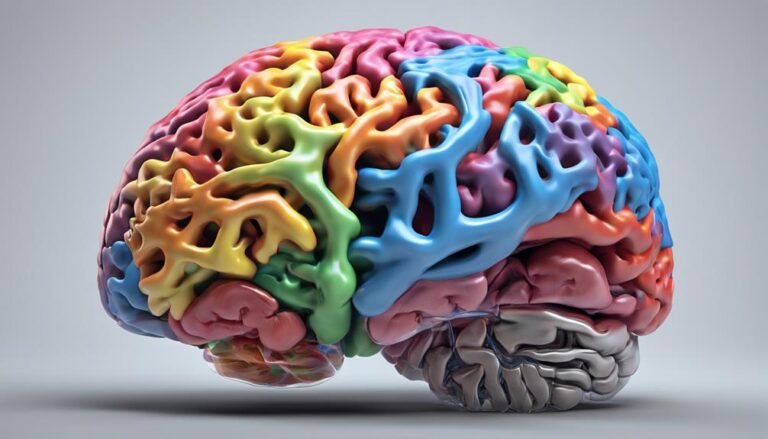The Impact of Personality on Relationship Satisfaction
Consider how your unique personality shapes the way you connect with your partner. From communication styles to conflict resolution approaches, your traits greatly influence the satisfaction you derive from your relationship. Understanding how compatibility in traits like agreeableness, extroversion, conscientiousness, and neuroticism impacts your dynamics can shed light on ways to enhance your bond. As you explore the intricacies of personality in relationships, you may uncover valuable insights that could transform the way you view and nurture your connection with your significant other.
Key Takeaways
- Compatibility in personality traits enhances relationship satisfaction and longevity.
- Agreeableness fosters collaborative conflict resolution and decision-making in relationships.
- Extroversion brings vibrant dynamics, open communication, and shared experiences.
- Conscientiousness contributes to trust, stability, and commitment in relationships.
- Managing neurotic tendencies through communication and coping strategies influences relationship satisfaction.
Personality Traits and Compatibility
Understanding how personality traits influence compatibility is essential in evaluating the potential for a satisfying and harmonious relationship dynamic. When considering personality compatibility, it's important to assess how well your traits align with your partner's to gauge the likelihood of long-term relationship satisfaction.
Compatibility assessments can offer valuable insights into areas where differences may exist, allowing both partners to work on understanding and accepting each other better.
Research indicates that higher levels of personality compatibility are often linked to increased relationship satisfaction and longevity. When partners share similar values, beliefs, and communication styles, it can lead to a deeper connection and a more fulfilling relationship experience.
On the other hand, significant disparities in key personality traits may lead to conflicts and challenges that could impact the overall harmony within the relationship.
Agreeableness and Relationship Dynamics
When it comes to relationship dynamics, your level of agreeableness plays a significant role in how conflicts are resolved and decisions are made collaboratively.
Your ability to navigate disagreements with understanding and empathy can greatly impact the satisfaction within your relationship.
Understanding the influence of agreeableness on your interactions can lead to more harmonious and fulfilling connections with your partner.
Agreeableness in Conflict Resolution
Handling conflicts with a partner can be impacted greatly by the level of agreeableness each individual exhibits in the relationship. When it comes to conflict resolution strategies, personality differences play a significant role in how smoothly disagreements are navigated.
Agreeableness, as one of the Big Five personality traits, refers to an individual's tendency to be cooperative, compassionate, and considerate in their interactions with others. In relationships, partners high in agreeableness are more likely to approach conflicts with empathy and a willingness to compromise, fostering a collaborative environment for resolution.
On the other hand, individuals lower in agreeableness may struggle with conflict resolution, often displaying more competitive or confrontational behaviors. This can lead to difficulties in finding mutually beneficial solutions and may escalate conflicts rather than resolve them.
Understanding each other's level of agreeableness can help partners adapt their communication styles and conflict resolution approaches to better navigate disagreements and strengthen their relationship. By acknowledging and valuing each other's differences in agreeableness, partners can work towards more harmonious resolutions and a deeper connection.
Collaborative Decision-Making Styles
In collaborative decision-making styles within relationships, the level of agreeableness exhibited by each partner greatly influences the dynamics of the relationship. When both partners possess a high level of agreeableness, decision-making tends to be more harmonious, with a focus on compromise and mutual understanding.
Collaborative communication becomes more effective as both individuals are open to exploring each other's perspectives and finding solutions that benefit the relationship as a whole.
However, when there's a disparity in agreeableness levels, decision-making can become more challenging. One partner may be more inclined to prioritize their own needs over the relationship, leading to potential conflicts and difficulties in reaching compromises. This imbalance can hinder collaborative problem-solving efforts and create tension within the relationship.
It is essential for partners to recognize and respect each other's decision-making styles, finding a balance that allows for effective collaboration and maintains relationship satisfaction. By fostering a supportive and understanding environment, couples can navigate decision-making processes more smoothly and strengthen their bond through collaborative efforts.
Extraversion in Partner Interactions
As an extrovert, your social energy often shapes the way you communicate and connect with your partner. Your interactions in relationships tend to be lively, engaging, and filled with a sense of shared experiences.
Your outgoing nature can bring a vibrant dynamic to your partnership, fostering a strong bond based on open communication and mutual understanding.
Extroverts' Social Energy
Embracing your partner's extraverted social energy can greatly enhance the dynamics of your relationship and boost overall satisfaction. Extroverted partners often bring a high level of energy and enthusiasm to social interactions, which can positively influence the social dynamics within your relationship. Their outgoing nature can lead to more active participation in social activities, creating a vibrant and engaging social life for both of you.
In relationship dynamics, having an extroverted partner can help balance energy levels, especially if you consider yourself more introverted. Their willingness to initiate conversations, make new connections, and engage with others can encourage you to step out of your comfort zone and enjoy new experiences together.
Communication and Connection
Engaging with your extroverted partner in communication and connection can greatly enrich the depth and quality of your interactions. Extroverts often thrive on social interactions and are skilled at initiating and maintaining conversations.
To foster a strong connection with your extroverted partner, it's essential to cultivate emotional intelligence and empathy. Understanding their need for social engagement and actively participating in conversations can enhance mutual understanding and closeness.
Communication with an extroverted partner can also be an opportunity for trust building and vulnerability. By openly sharing your thoughts and feelings, you can create a safe space for both partners to express themselves authentically.
This honesty and vulnerability can strengthen the bond between you and your extroverted partner, fostering a deeper connection based on mutual trust and understanding.
Interactions in Relationships
Understanding how extraversion influences partner interactions is essential for cultivating meaningful and harmonious relationships. Extraversion plays a significant role in how individuals engage with their partners, impacting various aspects such as trust-building and emotional support.
In relationships, individuals high in extraversion tend to be outgoing, sociable, and energetic, which can contribute positively to interactions with their partners.
When it comes to trust-building, extraversion can aid in establishing a strong foundation of trust within the relationship. Individuals high in extraversion are often perceived as warm and approachable, making it easier for their partners to confide in them and feel secure in the relationship. This trust-building process is vital for fostering a sense of security and intimacy between partners.
Moreover, extraversion also influences the emotional support provided within the relationship. Partners high in extraversion are typically more expressive and empathetic, offering comfort and understanding during challenging times. Their ability to provide emotional support can strengthen the bond between partners and create a supportive environment where both individuals feel valued and cared for.
Impact of Openness on Communication
Open communication plays an essential role in relationships, and the level of openness individuals exhibit can greatly impact their overall satisfaction in the relationship. When you prioritize open communication, you create a foundation for trust building.
Sharing your thoughts, feelings, and experiences openly with your partner fosters a sense of security and honesty, which are crucial for a healthy and fulfilling relationship. Through open communication, you allow for genuine emotional expression. This means being able to express your joys, fears, insecurities, and vulnerabilities without fear of judgment.
By being open and receptive to your partner's emotions as well, you create a safe space for both of you to feel understood and supported.
When you embrace openness in communication, you pave the way for deeper connections and a stronger bond with your partner. It allows for effective conflict resolution, better understanding of each other's needs, and a more profound sense of intimacy.
Conscientiousness and Relationship Stability
Effective relationship stability can be influenced by the level of conscientiousness exhibited by individuals in their interactions and decision-making processes. Conscientiousness plays a vital role in fostering trust and commitment between partners. When both individuals demonstrate a conscientious approach to their relationship, they're more likely to follow through on promises, be reliable, and prioritize the well-being of the partnership.
Trust and commitment are foundational elements of a stable relationship. Individuals high in conscientiousness tend to be dependable and responsible, which can enhance the trust between partners. This trust, in turn, strengthens the commitment to the relationship, creating a solid foundation for long-term stability.
Furthermore, conscientious individuals often provide strong emotional support to their partners. This emotional support can help navigate challenges and conflicts that may arise in the relationship, fostering a sense of security and closeness. By consistently showing up for each other and offering understanding and encouragement, conscientious individuals contribute significantly to the stability and satisfaction of the relationship.
Managing Neuroticism in Relationships
Managing neuroticism in relationships can require patience and effective communication strategies to foster understanding and mutual growth. Relationship insecurity often accompanies neurotic tendencies, leading to challenges in maintaining a stable and satisfying connection. Coping strategies, such as open dialogue and reassurance, can help alleviate these insecurities and build trust within the relationship.
Handling emotional volatility is another key aspect of managing neuroticism in relationships. Individuals high in neuroticism may experience frequent mood swings and intense emotional reactions, which can impact the dynamics of the relationship. By practicing self-awareness and mindfulness, both partners can navigate these fluctuations with empathy and support.
Ultimately, the way neuroticism is managed within a relationship can greatly influence its longevity. By approaching challenges with understanding and patience, partners can work together to address insecurities and emotional fluctuations effectively. Building a foundation of trust, communication, and mutual respect can help mitigate the negative effects of neuroticism and nurture a stable, fulfilling relationship.
Balancing Traits for Relationship Success
Managing the complexities of personality traits in a relationship requires a delicate balance to foster long-term success and fulfillment. Balancing traits for relationship success involves a blend of trust building and emotional intelligence.
Trust is the cornerstone of any healthy relationship. It requires transparency, reliability, and vulnerability. By cultivating trust, you create a strong foundation for open communication and mutual understanding.
Emotional intelligence plays an important role in handling the ups and downs of a relationship. It involves recognizing and managing your own emotions while also being attuned to your partner's feelings. Developing emotional intelligence allows you to communicate effectively, resolve conflicts peacefully, and show empathy towards your partner's experiences.
Finding the equilibrium between trust building and emotional intelligence is key to sustaining a harmonious and fulfilling relationship. It requires self-awareness, patience, and a willingness to grow together. By honing these skills, you can create a supportive and loving environment that nurtures the bond between you and your partner.
Conclusion
To sum up, aligning personalities pave the path for passionate partnerships.
Partner preferences play a pivotal role in relationship satisfaction.
Sharing similar traits like agreeableness enhances empathy and understanding.
Extraversion fosters fun and fulfilling interactions.
Openness encourages open and honest communication.
Conscientiousness guarantees reliability and stability.
Managing neuroticism with care can cultivate compassion and compromise.
Balancing these traits creates a harmonious blend, leading to lasting love and laughter.







